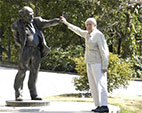Giovanni Berlinguer, Italian who inspired the Brazilian health reform, dies
Notícia publicada em:
- 8 de Abril de 2015
 Public Health Physician, Bioethicist, Congressman, Senator, Member of the European Parliament, inspirer of the Brazilian health reform, Member of the Italian Communist Party: there are many paths to trace the profile of Giovanni Berlinguer, who died at the age of 90 years in the early hours of Monday, April 6th, in Rome. His life is mixed with the history of struggles for the right to health, in the world. Doctor Honoris Causa by the Fiocruz, Berlinguer’s death was met with grief at ENSP.
Public Health Physician, Bioethicist, Congressman, Senator, Member of the European Parliament, inspirer of the Brazilian health reform, Member of the Italian Communist Party: there are many paths to trace the profile of Giovanni Berlinguer, who died at the age of 90 years in the early hours of Monday, April 6th, in Rome. His life is mixed with the history of struggles for the right to health, in the world. Doctor Honoris Causa by the Fiocruz, Berlinguer’s death was met with grief at ENSP.
– Today is a sad day for the world social medicine. Giovanni Berlinguer, a dear friend, was a person who inspired us a lot and was sympathetic at various times on the construction of our health reform and our history by building democracy. Particularly, he was a dear comrade, said Hermano Castro, Director of the school.
The researcher at ENSP Paulo Amarante reminded of modifications that his work produced in the area of occupational health and social determination of diseases.
– His contribution is unique, because it was the first to put into question the traditional models of social determination, especially in the field of labor, educational health, that he revolutionized rejudging, redoing the paradigmatic bases, posing the question of the environment, of the aggressors.
Amarante also told how important the contribution of Giovanni Berlinguer was in creating the Brazilian sanitary movement.
– He was one of the main references we had, especially in 1976, when, at the invitation of the newly created Brazilian Center for Health Studies – Cebes released its first book in Brazil: Medicine and Politics. Here he also released a book that supported the early bases of the psychiatric reform, Psychiatry and Power, through which we come to know the work and the experience of Franco Basaglia.
In the same way as Hermano, Paulo Amarante also has fond memories of his personal interaction with the Italian Physician.
-Giovanni took me in when I did my PhD in Italy. He received me in his own home,he did not seem to be a Senator of the Italian Republic, given its simplicity, warmth, affection.
More than his political and academic links, there were affectionate ties that, in the words of Berlinguer, allowed to him to create a long collaborative relationship with Brazil, a country he called “second homeland”, in an interview to the Fiocruz News Agency in 2007 .
Born in Sardinia, in the city of Sassari, in 1924, Giovanni Berlinguer was the son of a lawyer, human rights defender and brother of Enrico Berlinguer, the last great leader of the Italian Communist Party (PCI), which also had Giovanni as a prominent militant , until the dissolution of the party, in 2007. His political action, which begins in the student movement, brings him to Brazil for the first time in 1951, as Director of the International Association of Students. At the time, he was threatened with expulsion from the country by then Congressman Carlos Lacerda, who accused Giovanni of being a Russian spy. During the military dictatorship, his books were not well regarded by the owners of power in Brazil. Copies of Medicine and public health and health care in factories circulated clandestinely.
In Italy, he was elected three times, between 1972 and 1979. In 1983 he was elected Senator of the Italian Republic, being reelected in 1987. In 2009, he was elected a member of the European Parliament, as part of the party of European Socialists. Until the end of his life, the physician was a critic of the market society and the commercialisation of health, as it can be read in the excerpt below.
– A paradoxical situation has grown in recent decades. Advances in scientific knowledge guarantee (best) epidemiology of infections, diagnosis, prevention, therapy and rehabilitation. But the whole process has become more and more selective. Some may be processed and save themselves, while a much larger number of individuals cannot pay for these resources and dies.
Author of dozens of books and articles, in the academic field its trajectory starts in public health and culminates with a strong performance in the field of bioethics, which sought to bring everyday questions, related to equity in health, at a time when most scientists stood for extreme cases that arose from the use of new technologies in biology. The bridges created by Berlinguer between these two key areas for health can be found in the Universal Declaration on Bioethics and Human Rights, from Unesco, document that he helped to draft and which he states that “the achievement of the highest attainable standard of health is one of the fundamental human rights, without distinction of race, religion, political conviction and socioeconomic conditions”.
*Photo credit: Ana Limp/CCS/Fiocruz.
Source: Informe Ensp.




